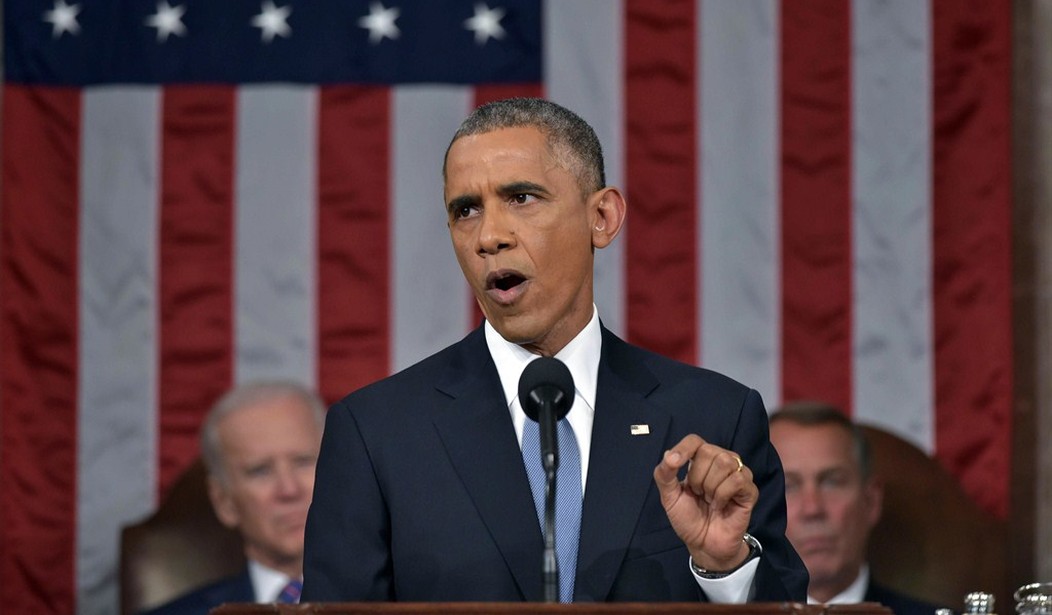Free community college, tax hikes, and raising the minimum wage are probably dead in the water, but trade, cybersecurity, ISIS war authorization, Keystone, and infrastructure are still open to deal making. Repealing the medical device tax, tax reform, and tweaks to the Patriot Act are also on the table. Yet, just because they’re open for discussion doesn’t make these policies a slam-dunk win for Obama in a Republican-dominated Congress.
Here is where we head for rocky shoals on these proposals, according to the Hill. Then again, they did rank these issues from most to least likely regarding becoming law. Given the cool reception Democrats made at the State of the Union regarding trade–and it's noted here–we shouldn't hold our breath on that one either:
Cybersecurity…
- House Republicans have passed cybersecurity bills in the last two sessions of Congress and have expressed an openness to working with the White House on the issue. Still, fights over privacy have thwarted legislation in the past, and there’s no guarantee lawmakers can thread the needle this time...
Trade…
- [D]oubts about whether President Obama can get Democrats onboard make legislation far from a sure thing, despite support from leading Republicans such as Rep. Paul Ryan (Wis.). Senate Minority Leader Harry Reid (D-Nev.) reiterated his opposition last week to approving fast-track trade authority. Many Democrats, echoing the views of labor unions, believe that trade deals hurt American workers by forcing them to compete with low-wage labor in foreign countries.
…
ISIS War Authorization
- Congress stopped short of a full-scale authorization of military force (AUMF) against the Islamic State in Iraq and Syria (ISIS) last September, instead approving a short-term authorization to train Syrian rebels against the group…Still, whether lawmakers will be willing to take a tough vote on the use of military force remains to be seen.
Infrastructure
- Republicans are signaling an interest in a funding increase for domestic transportation projects despite disagreements with Democrats over how to pay for it…Obama called for a "bipartisan infrastructure plan" in his State of the Union but didn't call for an increase in the gas tax, which is a non-starter with many Republicans.
Patriot Act
- Parts of the Patriot Act, which authorized spying programs in the wake of 9/11, will expire on June 1…The most controversial portion is Section 215, which the National Security Agency (NSA) uses to authorize the bulk collection of data about Americans' phone calls. Lawmakers may turn to a short-term extension if they can't agree on a broader proposal.
Repealing The Medical Device Tax
- House Republicans have voted over 50 times to repeal or modify ObamaCare, and are now pushing targeted changes to the law in hopes of drawing Democratic support…A bill to repeal the law's 2.3 percent sales tax on medical devices could get 60 votes in the Senate with the help of centrist Democrats and even more liberal members like Minnesota Democratic Sens. Al Franken and Amy Klobuchar. But whether Obama would accept the bill is unclear, as he has vowed not to sign any legislation that he believes undermines his signature legislative achievement. [The tax’s revenue goes to expanding coverage]
Tax Reform
- President Obama's "Robin Hood" proposal that would raise taxes on the wealthy isn't going anywhere, and the two parties remain worlds apart on individual tax reform…But the Obama administration and Republicans both suggested last week that there could be room for agreement on an overhaul of the tax code for businesses. Treasury Secretary Jack Lew has said bipartisan support exists for reducing the corporate tax rate from 35 to 28 percent. [Still. Sen. McConnell said at the GOP Retreat in Hershey that this leaves out a large swath of small businesses]
Keystone XL Pipeline
- Republicans made approving construction of the pipeline one of their top priorities after taking power in January…That doesn’t mean an Obama veto will be the end of the Keystone fight. The House approval earlier this month was the 10th Keystone vote since 2011, and the third in sixth months, as the GOP sought to ratchet up pressure on Obama. More votes on the issue are probably a sure bet even if they have no real chance of becoming law.
Recommended
Yeah, so given these obstacles, we shouldn’t be surprised if the ship of state runs aground in enacting any substantive legislation this session. Measured optimism is probably the best way to look at this new Congress, if you’re one that hopes that something will get done. While it's entirely possible that some of this stuff will pass both houses, we also have to factor in the multiple veto threats Obama has doled out in which case clinching 261 House members and 67 senators to override them is quite the hurdle.

Given that Obama had both chambers of Congress in Democratic control, his State of the Union proposals had a decent success rate; 50 percent were passed, including Obamacare. Now, with Republicans running the show, just 5 percent became law in 2013 and 14 percent in 2014, according to FiveThirtyEight.
How many of Obama's #SOTU proposals will become law? So far he's batting .235. http://t.co/Wa5q4rradz pic.twitter.com/mEHHul7hcv
— Ben Casselman (@bencasselman) January 21, 2015
























Join the conversation as a VIP Member